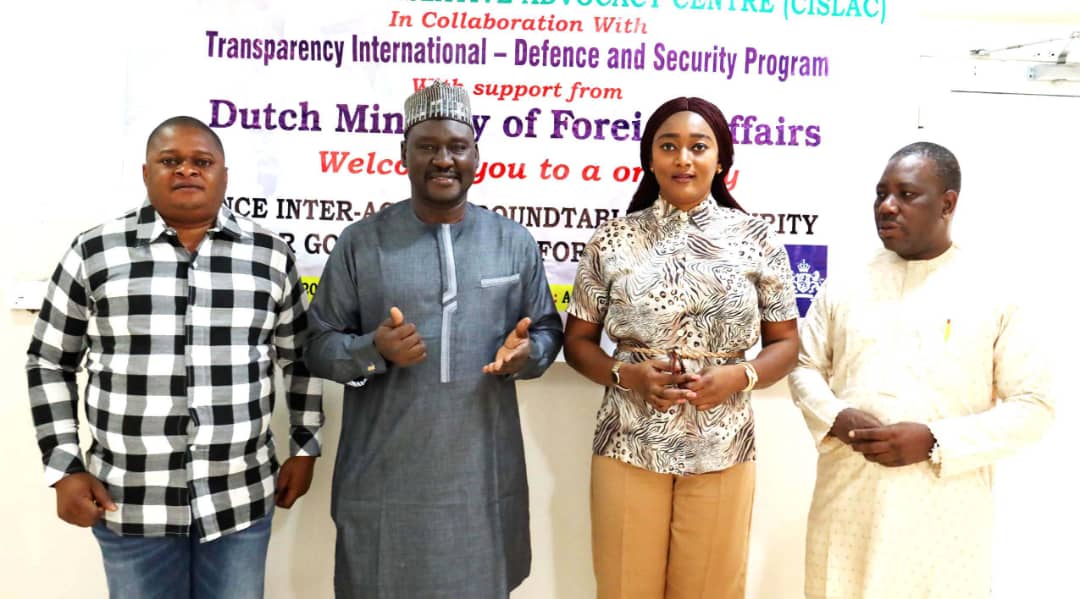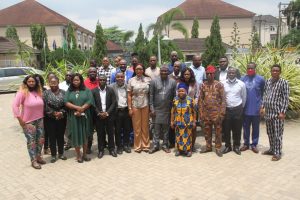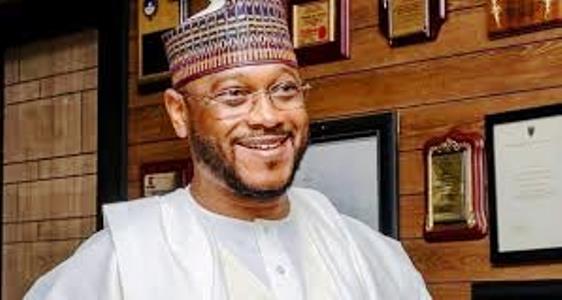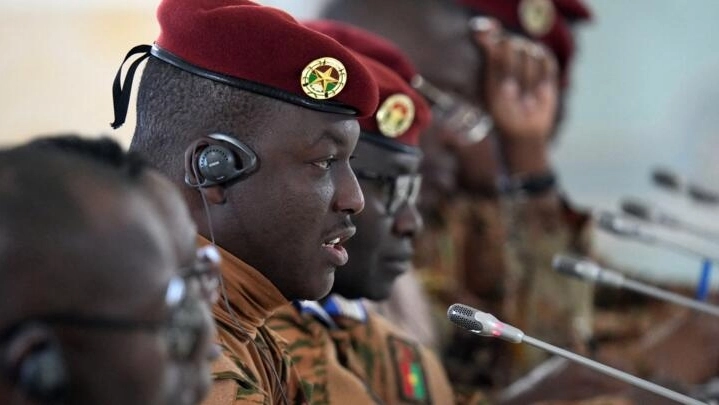How to have effective police reformation in Nigeria – CISLAC

By BASHIR ADEFAKA

Rafsanjani noted that the #ENDSARS, the way it started, was looking for change in the behaviour, change in terms of conduct and comportment of officers and personnel, but added that it should also be seeking for change in the attitude of people towards security men carrying out their duties.
Amidst #ENDSARS protests, the Civil Society Legislative Advocacy Centre (CISLAC), on Thursday October 15, 2020, made an interventionist attempt to join the Federal Government of Nigeria in finding workable solution to the corruption-inclined insecurity and abuse of position by security agents in the country, particularly operatives of the Nigerian Police Force.
The attempt, which came under the theme, ‘Inter-Agency Roundtable on Security Sector Reforms in Nigeria’, was held in Ikeja, Lagos State capital and attracted quality participants cutting across the anti-corruption agencies, security trust fund organizations, media and civil societies.
The roundatable was organized by CISLAC in collaboration with Transparency International-Defence and Security Programme and the Dutch Ministry of Foreign Affairs.
In his welcome remarks, Executive Director of CISLAC, Auwal Ibrahim Musa – Rafsanjani, averred that, “There is no way to ensure security if corruption is deeply rooted in the country,” but noted also that, “Security organizations cannot achieve the task without support of members of the society providing them with credible information.”

Another factor that could have aided lack of effective security of lives and property, which has to do with the welfare and security of those who provide security protection for the society, was also touched on by the frank-talking CISLAC boss when he said, “But security operatives are also human beings. There is the need to find out how their welfare and pays are being taken care of.”
On SARS, the Special Anti-Robbery Squad, he said, even from mere looking at operatives of the dreaded anti-robbery squad, one is put off wanting to join the Nigerian Police Force as against what is abroad where one proudly wants to become a policeman by their appearance and disposition to policing.
Rafsanjani noted that the #ENDSARS, the way it started, was looking for change in the behaviour, change in terms of conduct and comportment of officers and personnel, but added that it should also be seeking for change in the attitude of people towards security men carrying out their duties.
“The protest is not about just SARS alone or North, South or religion. It is about total reform. A clarion call for total reform of security” architecture of Nigeria.”
Umar Rafsanjani applauded President Muhammadu Buhari and the Inspector General of Police for agreeing with Nigerians who protested against the reprehensible behaviour of SARS and therefore embarking on the police reforms but advocated that “they should not just change name of SARS but also reform the attitude and conduct of members of the agency.”
Auwal Ibrahim Umar Rafsanjani, the CISLAC boss, said the Buhari’s government and IGP Mohammed Adamu-led police management should also ensure that required punishment is meted to those hiding under the SARS or any of the security agencies to commit atrocities against the same Nigerians they should protect.
He urged the government to ensure that politicians do not have capacity to hijack the protest by the #ENDSARS protesters to advance their own politician plans, adding that criminals such as ‘Yahoo Yahoo Boys’, armed robbers and cultists, who are the main targets for which SARS was established, should not be given chance to think that they have with ENDSARS now they have free day to operate.
“They should checkmate situation where Nigerians do not feel great and fulfilled in the own country” ventilating his sadness asking “Why should Nigerians have to travel out of their country to get better things of life they want? To get admission into the university, to get healthcare and so on and so forth you must part with something. It is sad!” He said.
Rafsanjani said the politicians who do not have money before getting to office now make money and give themselves security protection but warned that they should remember they will leave the position and return to the same society querying why they do not put the arrangement in place for their own good in the future and the good of others.
“If the whole city is safe, you don’t need security escort and police guard.” He said.
Goodwill and contributory messages were taken among which were where participants agreed that situation where a society is handed to thugs and touts, there can be no security and development.
A detailed communiqué was issued at the end of the one-day roundtable in which the background, deliberations and recommendations were all-encompassingly recorded.
Read the Communique in details
Communique Issued at the End of a One Day Summit on Inter Agency Roundtable on Security Sector Reforms in Nigeria Organized by Civil Society Legislature Advocacy Centre (CISLAC) in Collaboration with Transparency International-Defence and Security Programme and The Dutch Ministry Of Foreign Affairs Held on Thursday, October 15, 2020.
Background
Since Nigeria returned to democracy in 1999, milestones have been recorded in the political economy, in the area of security, science, art and culture. However, a major recurrent problem is insecurity as manifested in the low scale war against insurgents in the North East, North West and a string of violent criminal gangs in Southern part of the country. The challenges of corruption are fueled by corruption, poverty, lack of access to the essentials of life, human right violations, weak institutions and lack of a well-coordinated and effective regional legal framework. The Inter-Agency roundtable on Security Sector Reforms in Nigeria was put together to address the inter-connectivity of socio-political development and regional security framework in West Africa. Most West African states have weak institutions making it difficult to States respond to the challenges of regional security and livelihood of the over 300million people in the sub-region.
There have been various efforts conceptualized in frameworks like the ECOWAS Conflict Prevention Framework (ECPF), adopted by the Mediation and Security Council (MSC) in January 2008. The ECPF is intended as a “comprehensive operational conflict prevention and peace-building strategy” The Inter-Agency Roundtable summit hope to advance human security within the context of sustainable development on a regional scale taking into consideration the need to effectively coordinate inter-agency partnership towards a robust Security Sector Reforms/Governance.
Participants at the historic summit were drawn from the Nigeria Police Force, the Lagos State Security Trust Fund (LSSTF), the Legislative arm, MDAs, Nigerian Bar Association, (NBA), the media, civil society, the Economic and Financial Crimes Commission (EFCC), the Independent and Corrupt Practices Commission (ICPC), and other stakeholders. The retinue of rich resource persons included Bertha Ogbimi, Onyeisi Chiemeke, Salaudeen, Chiemelie Ezeobi, Coordinator, international Press centre, (IPC) Mr. Lanre Arogundade and many others.
Deliberations
•Participants addressed critical issues relevant to security of lives and property in Nigeria which includes but not limited to Main expectations and opportunities for Security Sector reforms in Nigeria; from Regional to National: Understanding the concept, principle, policy influence and coordination of Security Sector Reforms in Nigeria. The deliberations were followed by Panel Discussions on challenges with the Security Sector Governance- Reforms in Nigeria, how to localize SSCIR framework in Nigeria, the National Action Plan on the operationalization of the ECPF and the roles of stakeholders and their spheres of influence.
•That security means posterity and safety of life and property for all. Without security, prosperity and the sustenance of democracy will be difficult.
•That security is not just a local affair, it is also regional and global issue raising the importance of regional and international cooperation.
•That Nigeria is the biggest democracy in Africa. The country should harness her potentials for the full development and prosperity of her people which would make the country become a reference point for best global practices.
•That Nigeria occupies a strategic place in regional and global affairs which underscores the need for the country to develop a framework that can serve as a reference point for ECOWAS and all member states.
•Participants observed that the challenge of security remains a major obstacle to sustainable livelihood in Nigeria manifested in the on-going END SARS protests that have engulfed the country being the symptom of a deeper conflict arising from the crisis of quality leadership.
•That security in Nigeria is often seen as the protection of political actors. This manifests, for instance, in the deployment of some 40 percent of police workforce to service the personal needs of state officials while the majority of vulnerable communities are left unprotected.
•That violence in Nigeria is not unconnected with injustice, corruption which are linked to expensive governance system, class distinction, poverty, loss of hope, and upheavals arising from the loss of confidence in the country’s leadership and other democratic institutions.
•That the quality of the electoral process has diminished in recent years having been characterized by vote-buying, making victory at the poll the preserve of the highest bidder. That vote buying has become a recurrent decimal, whereas it undermines the integrity of the elected and diminishes the moral credibility of the electorate to ask for good governance and stand against corruption.
•That participants recognize the urgent need to fully employ Information Technology by digitalizing policing and other financial transactions which will enrich data gathering and storage apart from drastically reducing corruption within the system.
•That the defect in the security framework is symptomatic of declining leadership quality, floundering cultural values, underlining the fact that the more a system fails to protect the people, and the more likely people are lured to violence.
•That the security deficit is further compounded by duplications of operational institutions and the conflict of functions that often arise from such, for instance at present in Nigeria, the military is overstretched having to deal with civil conflict instead of focusing mainly on external aggression.
•That most of the time, reforms in the security system have dealt with appearances instead of dealing with fundamentals.
That participants recognise the various reforms instituted in the past few years especially electoral reforms and the setting up of anti-corruption institutions and their unique contributions to the fight against corruption. That these efforts are commendable and have demonstrated the capacity of the government to do more.
That participants appreciate the outstanding performance of some individuals within the anti-corruption institutions and the security operatives including but not restrictes to the police.
Recommendations
After exhaustive deliberations, the summit made the following recommendations.
•That Nigerian leaders should be anxious to deliver quality governance to enhance social, cultural and economic security for the increasingly restless population.
•That the functions and activities of the various security institutions should be streamlined to avoid conflict of roles.
•That the security institutions should adopt Information Technology in order to enhance relevant security data and information storage.
•That the security institutions should place emphasis on intelligence gathering for an effective policing system.
•Corruption should be holistically confronted within the policing system through sanctions for offenders and provision of better economic incentives for security personnel like insurance, social security and institutional capacity building.
•A corrupt electoral system cannot produce good leadership.Corruption in the electoral process should be immediately addressed to ensure the emergence of credible, honest and effective political leadership.
•The private sector and communities should be more involved towards public interest driven policing.
•Nigeria should domesticate all relevant regional and international laws and conventions that would help promote security, peace and prosperity in the country, more importantly, the domestication and localizing SSG/R framework towards a National Action Plan on the ECPF.
•There is the need for a network of stakeholders for constructive engagement towards the realisation of these noble recommendations.
•Participants commended CISLAC for its historic contributions over the years in partnership with local and international organisations towards an effective and robust security framework in Nigeria and West African sub region towards global peace.








